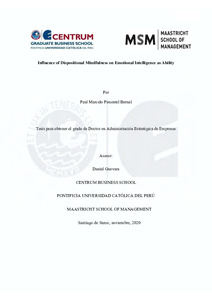Influence of Dispositional Mindfulness on Emotional Intelligence as Ability
Abstract
The purpose of this quantitative, correlational, descriptive, and cross-sectional
research that uses structural equations is to contribute to and make progress in the
understanding of mindfulness and emotional intelligence as ability, to explain the influence
of mindfulness on emotional intelligence, to explain the direction between the constructs, to
assess the positive relationship between emotional intelligence and its equivalence with trait
emotional intelligence. Based on the ability model of emotional intelligence (Caruso, Mayer
& Salovey, 2002), the trait model of emotional intelligence (Schutte et al., 1998, 2009), the
comprehensive dimensional model of emotional intelligence (Shutte & Malouff, 2013), the
dispositional mindfulness model (Shapiro, Carlson & Astin, 2006), and the measurement
models of emotional intelligence as one-dimensional character trait (Schutte et al., 1998). The
target population from which the sample will be drawn will be selected from private postgraduate
schools in Peru, using statistical inferences and structural equation analysis. The
results will fill gaps in the literature for empirically evaluating the influence effect of
mindfulness on ability emotional intelligence, the link between emotional intelligence and
other variables will be achieved in the face of the need to increase research and provide better
estimates of its dimensions and its relationships (Quaglia et al., 2016). In light of the results,
it is suggested that dispositional mindfulness has a positive and significant relationship with
emotional intelligence as a skill and as a trait, and it is corroborated that it can be a platform
for its development in organizations.
Key Words: Emotional Intelligence, Mindfulness
Temas
Inteligencia emocional
Para optar el título de
Doctor en Administración Estratégica de Empresas
Collections
The following license files are associated with this item:





